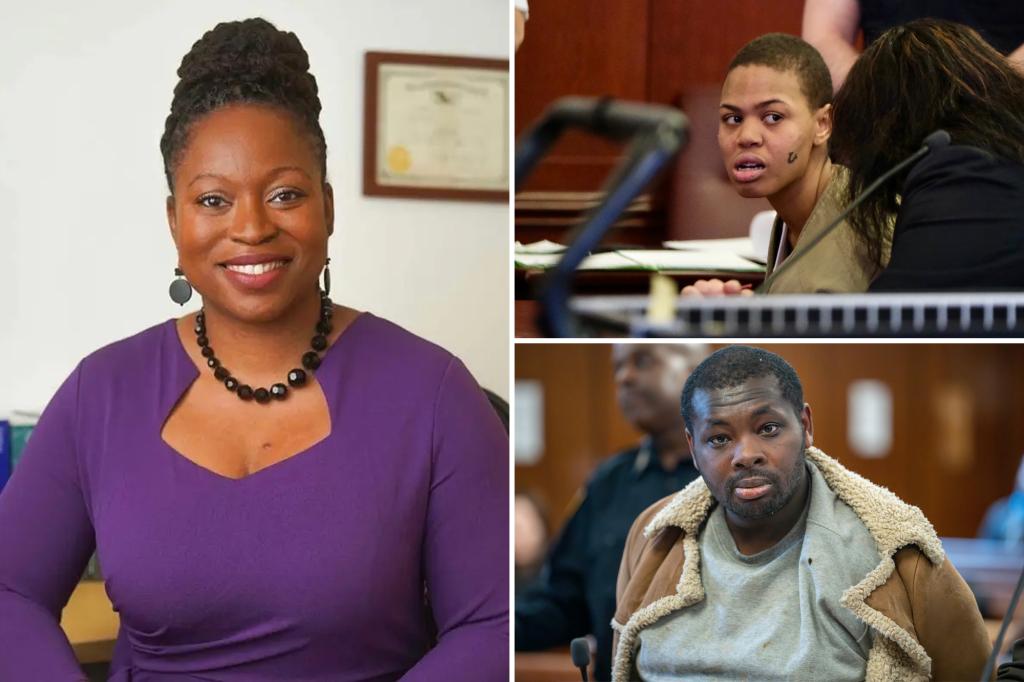The article criticizes Judge Marva Brown’s leniency in granting bail to repeat offenders, highlighting three specific cases. The first involves Markeese Brazelis, charged with sexual abuse for groping a woman on a subway platform. Despite the charge being bail-eligible, Judge Brown released him. Days later, Brazelis allegedly shoved another woman into a moving subway train, confessing to being high and angry during the incident. This incident sparked outrage, with MTA Chairman Janno Lieber condemning the judge’s decision as endangering public safety. The Manhattan DA’s office defended its lack of bail request, citing Brazelis’s limited prior criminal history. However, sources reveal he also faced a trespassing charge for entering a restricted subway area the same week.
The article proceeds to detail two more instances of Judge Brown’s perceived leniency. Amira Hunter, with eight prior arrests and a history of missed court appearances, assaulted a subway cellist with a metal water bottle. Prosecutors requested $15,000 bail, arguing her past behavior indicated a flight risk. Judge Brown instead opted for supervised release. Less than a week later, Hunter was arrested for shoplifting, prompting Brown to finally set bail at $500. In another case, Bryant Kenyatta, with twelve prior arrests, allegedly fractured a podcaster’s arm with nunchucks. Despite the prosecution’s request for $100,000 bail, Brown again granted supervised release. A veteran police officer criticizes Brown’s pattern of releasing defendants, arguing it jeopardizes public safety.
The article then delves into Judge Brown’s political background. Elected in 2023 to a 10-year term on the Brooklyn Civil Court, she ran on the Democratic and Working Families Party tickets, garnering endorsements from progressive politicians. A former Legal Aid attorney and board member of Families and Friends of the Wrongfully Convicted, Brown received praise from local officials after her election. Currently earning a $216,400 salary, she is temporarily assigned to Manhattan Criminal Court to address operational needs. During a previous campaign, Brown emphasized her commitment to fairness and impartiality, while also highlighting her belief in rehabilitation and the potential for individuals to improve.
The article then addresses the legal context surrounding bail in New York. Uniquely, New York law prohibits judges from considering a defendant’s dangerousness when setting bail. However, Joan Illuzzi-Orbon, a former prosecutor, argues that Judge Brown could have considered the defendants’ extensive criminal histories as a factor influencing their likelihood of returning to court. The repeated release of violent offenders with lengthy records raises concerns about the effectiveness and fairness of the current bail system. Jennifer Harrison, founder of Victims Rights NY, expresses frustration with the perceived leniency shown to repeat offenders and criticizes the “woke” ideology she believes influences judicial decisions.
The Office of Court Administration (OCA) declined to comment on specific bail decisions, stating that judges have discretion based on individual assessments of flight risk, and reiterating that dangerousness is not a legally permissible consideration in New York. Judge Brown did not respond to requests for comment on the criticisms levied against her decisions. The article concludes by highlighting the ongoing debate over bail reform and its impact on public safety. The cases cited raise questions about the balance between individual rights and the need to protect the community from repeat offenders. The absence of consideration for dangerousness in New York’s bail laws remains a contentious issue, with critics arguing it contributes to a revolving door of criminal justice.
The recurring theme throughout the article is the perceived disconnect between Judge Brown’s decisions and the public’s expectation of judicial accountability for community safety. The author presents a narrative portraying Judge Brown as a lenient judge whose decisions have repeatedly allowed potentially dangerous individuals back onto the streets, leading to further alleged crimes. The article emphasizes the victims’ perspectives and the frustration of law enforcement officials, highlighting the potential consequences of a bail system that prioritizes individual rights over public safety concerns. This narrative underscores the complexities of bail reform and the ongoing debate regarding its efficacy and potential unintended consequences.










